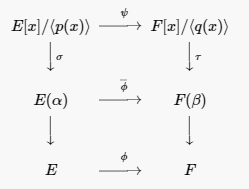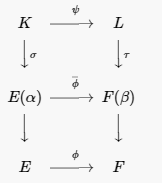21.2: Splitting Fields
( \newcommand{\kernel}{\mathrm{null}\,}\)
Let F be a field and p(x) be a nonconstant polynomial in F[x]. We already know that we can find a field extension of F that contains a root of p(x). However, we would like to know whether an extension E of F containing all of the roots of p(x) exists. In other words, can we find a field extension of F such that p(x) factors into a product of linear polynomials? What is the “smallest” extension containing all the roots of p(x)?
Let F be a field and p(x)=a0+a1x+⋯+anxn be a nonconstant polynomial in F[x]. An extension field E of F is a splitting field of p(x) if there exist elements α1,…,αn in E such that E=F(α1,…,αn) and
p(x)=(x−α1)(x−α2)⋯(x−αn).
A polynomial p(x)∈F[x] splits in E if it is the product of linear factors in E[x].
Example 21.29.
Let p(x)=x4+2x2−8 be in Q[x]. Then
Solution
p(x) has irreducible factors x2−2 and x2+4. Therefore, the field Q(√2,i) is a splitting field for p(x).
Example 21.30.
Let p(x)=x3−3 be in Q[x]. Then p(x) has a root in the field Q(3√3).
Solution
However, this field is not a splitting field for p(x) since the complex cube roots of 3,
−3√3±(6√3)5i2,
are not in Q(3√3).
Theorem 21.31.
Let p(x)∈F[x] be a nonconstant polynomial. Then there exists a splitting field E for p(x).
- Proof
-
We will use mathematical induction on the degree of p(x). If degp(x)=1, then p(x) is a linear polynomial and E=F. Assume that the theorem is true for all polynomials of degree k with 1≤k<n and let degp(x)=n. We can assume that p(x) is irreducible; otherwise, by our induction hypothesis, we are done. By Theorem 21.5, there exists a field K such that p(x) has a zero α1 in K. Hence, p(x)=(x−α1)q(x), where q(x)∈K[x]. Since degq(x)=n−1, there exists a splitting field E⊃K of q(x) that contains the zeros α2,…,αn of p(x) by our induction hypothesis. Consequently,
E=K(α2,…,αn)=F(α1,…,αn)
is a splitting field of p(x).
The question of uniqueness now arises for splitting fields. This question is answered in the affirmative. Given two splitting fields K and L of a polynomial p(x)∈F[x], there exists a field isomorphism ϕ:K→L that preserves F. In order to prove this result, we must first prove a lemma.
Theorem 21.32.
Let ϕ:E→F be an isomorphism of fields. Let K be an extension field of E and α∈K be algebraic over E with minimal polynomial p(x). Suppose that L is an extension field of F such that β is root of the polynomial in F[x] obtained from p(x) under the image of ϕ. Then ϕ extends to a unique isomorphism ¯ϕ:E(α)→F(β) such that ¯ϕ(α)=β and ¯ϕ agrees with ϕ on E.
- Proof
-
If p(x) has degree n, then by Theorem 21.13 we can write any element in E(α) as a linear combination of 1,α,…,αn−1. Therefore, the isomorphism that we are seeking must be
¯ϕ(a0+a1α+⋯+an−1αn−1)=ϕ(a0)+ϕ(a1)β+⋯+ϕ(an−1)βn−1,
where
a0+a1α+⋯+an−1αn−1
is an element in E(α). The fact that ¯ϕ is an isomorphism could be checked by direct computation; however, it is easier to observe that ¯ϕ is a composition of maps that we already know to be isomorphisms.
We can extend ϕ to be an isomorphism from E[x] to F[x], which we will also denote by ϕ, by letting
ϕ(a0+a1x+⋯+anxn)=ϕ(a0)+ϕ(a1)x+⋯+ϕ(an)xn.
This extension agrees with the original isomorphism ϕ:E→F, since constant polynomials get mapped to constant polynomials. By assumption, ϕ(p(x))=q(x); hence, ϕ maps ⟨p(x)⟩ onto ⟨q(x)⟩. Consequently, we have an isomorphism ψ:E[x]/⟨p(x)⟩→F[x]/⟨q(x)⟩. By Proposition 21.12, we have isomorphisms σ:E[x]/⟨p(x)⟩→E(α) and τ:F[x]/⟨q(x)⟩→F(β), defined by evaluation at α and β, respectively. Therefore, ¯ϕ=τψσ−1 is the required isomorphism (see Figure 21.33).

Figure 21.33.
We leave the proof of uniqueness as a exercise.
Theorem 21.34.
Let ϕ:E→F be an isomorphism of fields and let p(x) be a nonconstant polynomial in E[x] and q(x) the corresponding polynomial in F[x] under the isomorphism. If K is a splitting field of p(x) and L is a splitting field of q(x), then ϕ extends to an isomorphism ψ:K→L.
- Proof
-
We will use mathematical induction on the degree of p(x). We can assume that p(x) is irreducible over E. Therefore, q(x) is also irreducible over F. If degp(x)=1, then by the definition of a splitting field, K=E and L=F and there is nothing to prove.
Assume that the theorem holds for all polynomials of degree less than n. Since K is a splitting field of p(x), all of the roots of p(x) are in K. Choose one of these roots, say α, such that E⊂E(α)⊂K. Similarly, we can find a root β of q(x) in L such that F⊂F(β)⊂L. By Lemma 21.32, there exists an isomorphism ¯ϕ:E(α)→F(β) such that ¯ϕ(α)=β and ¯ϕ agrees with ϕ on E (see Figure 21.35).

Figure 21.35.
Now write p(x)=(x−α)f(x) and q(x)=(x−β)g(x), where the degrees of f(x) and g(x) are less than the degrees of p(x) and q(x), respectively. The field extension K is a splitting field for f(x) over E(α), and L is a splitting field for g(x) over F(β). By our induction hypothesis there exists an isomorphism ψ:K→L such that ψ agrees with ¯ϕ on E(α). Hence, there exists an isomorphism ψ:K→L such that ψ agrees with ϕ on E.
Corollary 21.36.
Let p(x) be a polynomial in F[x]. Then there exists a splitting field K of p(x) that is unique up to isomorphism.



